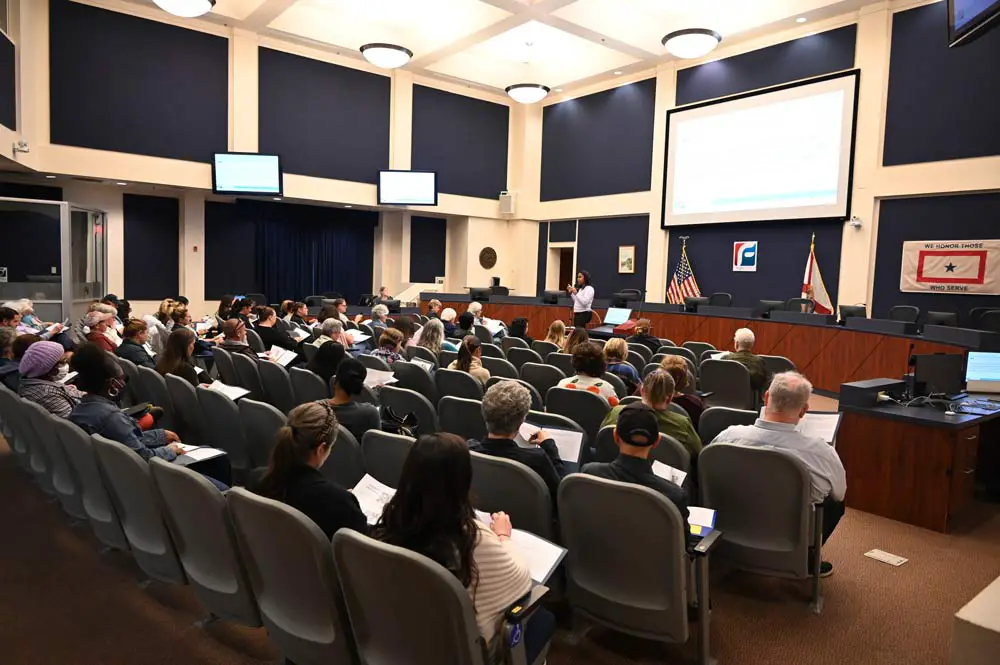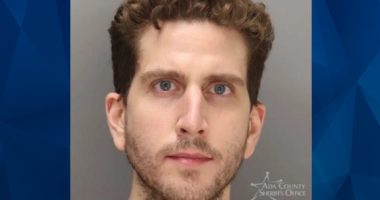
A challenge to the Bible’s presence in some of Flagler County’s public school libraries is unraveling the inconsistencies, contradictions, flaws, and arbitrariness of Flagler County’s book-challenge process.
The challenge, filed by Palm Coast resident Bob Gordon, cites 67 passages, almost all from the Old Testament and “most of” the Book of Revelation in the New. The passages, the challenge claims, are sexually explicit, sadistic, graphically violent and bigoted, and violate Florida law’s prohibition of such materials in students’ reach.
Gordon does not expect to prevail. He filed the challenge in the same spirit as similar challenges filed elsewhere in the country. The challenge, he says, is “pointing out the hypocrisy, the book banning stupidity, the flaws in the review process.”
Gordon’s challenge was filed last summer. After going through one step, it is now being reviewed by Superintendent LaShakia Moore, as she confirmed on Wednesday. “It’s at my level right now,” she said. “It’s at the district.” (The Observer’s Brent Wonroff first reported on this challenge Thursday.) Neither Moore nor the district have handled the challenge according to the highly-publicized procedures Moore herself unveiled before she was superintendent in February 2023.
At the time, Moore explained that a challenged book would first be reviewed at the school level–at the school or schools where the book was being challenged. It would be be reviewed by a committee of faculty members and residents. The committee meeting would be publicly noticed well ahead of time so anyone could attend.
That committee’s decision could be appealed, but to a district-level committee similarly made up of district staffers, faculty members and residents who would hold a previously-noticed, open meeting and vote on their decision. Moore in February was speaking to some 70 people who had turned out to be volunteer members of those book-challenge-reviewing committees. Many were appointed, many served on several such committees, with some books getting banned, some not.
At both school and district levels, the committees were responsible for explaining their rationale and decisions through a standard, detailed document that outlined numerous questions. The committee had to answer each question in writing and make that document publicly available.
None of those steps were followed in the Gordon challenge: no such school-level committee met. No community members were involved. No questionnaire was filled out.
The next step was not to be Moore: the superintendent is the third level in a challenge’s gradations. When Moore said Wednesday that the challenge was at the district level, it–according to her own plan outlined in February–should have meant that a district-level committee would review the book and generate its own answers to a questionnaire, and a vote.
The Bible never was.
It was reviewed only by an obscure “team” whose meeting was never publicized and whose members not disclosed. (The names of those who served on the committee, and the document they may have produced and submitted to the superintendent, have been requested from the district, but were not provided before this article initially published.)
Celeste Ackerman, a district-level staffer and the supervisor of K-12 media, wrote Gordon on Sept. 1 that “The team has reviewed your request of reconsideration of the Bible. Portions of the Bible are a part of our B.E.S.T. recommended reading list and cannot be challenged in this format however; [sic.] a parent may elect to not have their child read this material.”
Ackerman’s explanation is not entirely accurate. B.E.S.T. is the state Department of Education’s acronym for “Benchmarks for Excellent Student Thinking.” Around the same time that Moore was explaining Flagler County’s book-challenge process last February, the department issued a list of some 350 titles that make up the recommended reading list–novels, non-fiction works, poems, speeches, historical documents and the like. (See the full list here.)
The Bible as a whole, made up of 66 books, is not on the list. But three of the Old Testament’s books are: the Book of Esther for seventh grade, Samuel 2 for 10th grade, and the Psalms for 11th grade. The state standards don’t specify what version of the Bible is sanctioned–a significant flaw in the state’s recommendations, since Bible versions are as innumerable as they are different one from the other. (See examples at the foot of the article.)
“My challenge did not address just ‘portions’ of the Bible,” Gordon wrote Moore on Sept. 6. “It claimed that the extent of the book’s problematic content was such that it rose to the level of holistic inappropriateness for the numerous reasons proffered in my Reconsideration of Materials request and its addendum. And the mention of a reading list of ‘portions of the Bible’ has no particular relevance given that seemingly those could be challenged as well.” In a parenthesis, he added: “It was curious to note that a Biblical ‘portion’ on the Flagler recommended reading list was the ‘Book Of Psalms.’ Take a look at Psalm 137:9” That verse reads: “Blessed the one who seizes your children and smashes them against the rock: the children represent the future generations, and so must be destroyed if the enemy is truly to be eradicated.”
When asked about the lack of committee review, Moore’s answer reflected the convoluted, at times intractable methods the district is applying to its challenges, especially since the Legislature further complicated matters with a new law last spring. But that new law made challenges easier, broadening the scope of what may be challenged. It did not change local methods in place to address the challenges.
“Before we go to a committee, our media specialists, they are the first line of defense per se,” Moore said. “They have to determine: this is going against–they’re saying that it’s sexual content and all of that in there. There are statutes related to that. So we can’t send that out to a committee to make a determination. First, our media specialists have to make a determination around the material first, and so we’re in the process of working through what that looks like as we adjust to the new statutes that were approved last session.”
Based on several of the passages cited by Gordon, there would appear to be little question that the content violates the 2023 law’s more expansive definition of inappropriate materials.
Read Related Also: Launceston stabbing: Husband waiting for wife allegedly attacked on roof of shopping centre
On September 9, Shannon Rambow, who heads the local chapter of the extremist group known as Moms for Liberty, wrote Moore in light of the new law to note that “The bill requires that specific materials subject to an objection on the basis that the materials are pornographic, are harmful to minors, or describe or depict sexual activity must be removed from circulation at the school where the objection was made, within 5 days of the school district’s receipt of the objection, until the completion of the objection process.”
Moms for Liberty objections led to the removal of numerous books last school year on that basis, though the group never filed objections to any parts of the Bible. Rambow claimed that “liberals are trying to go around the law to keep pornography and sexually explicit content in schools,” though it appears the group might use tactics of its own to keep the Bible in schools. Like Gordon’s challenge, The Rambow email underscores the district’s conflicting, and conflicted, approaches to book challenges.
But it prompted a response from Moore that revealed that even books committees voted to keep on shelves last school year have been removed, and that removals have been more sweeping that publicly known: “We have spent several days and hours complying with logging of classroom libraries and removing books and other materials that are in violation of the new language,” Moore wrote Rambow. “We have already removed books that were retained through book review committees in previous years. With the volume of books in our libraries we are using many strategies to identify books that are in violation of the current law/rule including monitoring books that are being removed in other counties.”
There was no word about the Bible.
“The hard part about the Bible,” Moore said in an interview Wednesday, “it was attempted to be challenged once and the decision was already made about that challenge to keep in, that it was not challengeable. But statutes have changed. And so we’re moving through that process.” She said an added complication about the Bible is its structure, not being a single book: “It’s not just material that is self selected, but portions of it are included in courses as well, different courses of study,” the superintendent said.
To Gordon, his challenge is getting a response that is neither surprising, given the local school board’s makeup, nor tenable under the law.
“The school district’s approach so far has clearly been to attempt to hold the Bible to a different standard and in a manner not supported by policy or statute and obviously by equitableness,” Gordon wrote. “Applying this special treatment to a particular religious text and claiming it is beyond reproach or immune to challenge may be fine for a church, but not a public school. To do so is more akin to a theocracy than a democracy.”
See the challenged passages here.
![]()
The Bible’s Numerous, Different Versions
There is no single Bible. In English alone there are innumerable translations and versions, some centuries old, some contemporary, each presenting content with smaller or greater differences. Here’s one example of those differences, taking a passage about Lot and his incestuous daughters, from Genesis.
In the original King James version, the passage is rendered in the kind of allusive, poetic language beyond the comprehension of most young readers with a mind for titillation:
And the firstborn said unto the younger, Our father is old, and there is not a man in the earth to come in unto us after the manner of all the earth: Come, let us make our father drink wine, and we will lie with him, that we may preserve seed of our father. And they made their father drink wine that night: and the firstborn went in, and lay with her father; and he perceived not when she lay down, nor when she arose. And it came to pass on the morrow, that the firstborn said unto the younger, Behold, I lay yesternight with my father: let us make him drink wine this night also; and go thou in, and lie with him, that we may preserve seed of our father.
The Names of God Bible is more direct, with stylistic hints often found in young adult fiction:
The older daughter said to the younger one, “Our father is old. No men are here. We can’t get married as other people do. Let’s give our father wine to drink. Then we’ll go to bed with him so that we’ll be able to preserve our family line through our father.” That night they gave their father wine to drink. Then the older one went to bed with her father. He didn’t know when she came to bed or when she got up. The next day the older daughter said to the younger one, “I did it! Last night I went to bed with my father. Let’s give him wine to drink again tonight. Then you go to bed with him so that we’ll be able to preserve our family line through our father.”
The New Century Version is more explicit still, this time sounding a bit more like a Kaiser Family Foundation brief:
One day the older daughter said to the younger, “Our father is old. Everywhere on the earth women and men marry, but there are no men around here for us to marry. Let’s get our father drunk and have sexual relations with him. We can use him to have children and continue our family.” That night the two girls got their father drunk, and the older daughter went and had sexual relations with him. But Lot did not know when she lay down or when she got up. The next day the older daughter said to the younger, “Last night I had sexual relations with my father. Let’s get him drunk again tonight so you can go and have sexual relations with him, too. In this way we can use our father to have children to continue our family.”
![]()
Click On:
|








